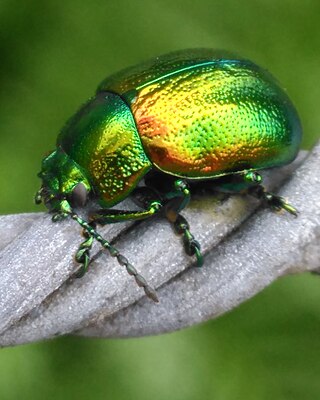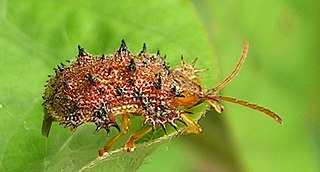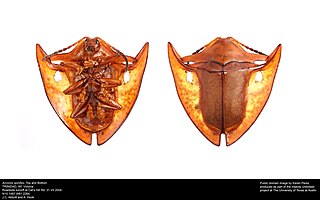
Beetles are insects that form the order Coleoptera, in the superorder Endopterygota. Their front pair of wings are hardened into wing-cases, elytra, distinguishing them from most other insects. The Coleoptera, with about 400,000 described species, is the largest of all orders, constituting almost 40% of described insects and 25% of all known animal species; new species are discovered frequently, with estimates suggesting that there are between 0.9 and 2.1 million total species. Found in almost every habitat except the sea and the polar regions, they interact with their ecosystems in several ways: beetles often feed on plants and fungi, break down animal and plant debris, and eat other invertebrates. Some species are serious agricultural pests, such as the Colorado potato beetle, while others such as Coccinellidae eat aphids, scale insects, thrips, and other plant-sucking insects that damage crops.

The insects of the beetle family Chrysomelidae are commonly known as leaf beetles, and include over 37,000 species in more than 2,500 genera, making up one of the largest and most commonly encountered of all beetle families. Numerous subfamilies are recognized, but the precise taxonomy and systematics are likely to change with ongoing research.

The Tansy beetle is a species of leaf beetle. The common name derives from its main foodplant, Tansy, but it can also use other wetland plants such as Gypsywort and Water Mint. It measures 7.7–10.5 mm in length and has a characteristic bright metallic green colouration, with pitted elytra and a coppery tinge. In addition to the nominotypical subspecies, which repeats the specific name, C. graminis graminis, there are five further distinct subspecies of Tansy beetle, which, collectively, have a Palearctic distribution, although in the majority of countries where it is found the species is declining. In the United Kingdom it is designated as 'Nationally Rare'. The stronghold population here is located along the banks of the river Ouse in York, North Yorkshire. Other, small, fenland populations exist at Woodwalton Fen and at Welney Wildfowl and Wetlands Trust (WWT) reserve.

Sociality is the degree to which individuals in an animal population tend to associate in social groups (gregariousness) and form cooperative societies.

Chrysochus cobaltinus, the cobalt milkweed beetle or blue milkweed beetle, is a member of the diverse family leaf beetles (Chrysomelidae). It occurs in the Western United States and British Columbia.

The Chrysomelinae are a subfamily of leaf beetles (Chrysomelidae), commonly known as broad-bodied leaf beetles or broad-shouldered leaf beetles. It includes some 3,000 species around the world.

The Eumolpinae are a subfamily of the leaf beetles, or Chrysomelidae. It is one of the largest subfamilies of leaf beetles, including more than 500 genera and 7000 species. They are oval, and convex in form, and measure up to 10 mm in size. Typical coloration for this subfamily of beetles ranges from bright yellow to dark red. Many species are iridescent or brilliantly metallic blue or green in appearance.

The Cassidinae are a subfamily of the leaf beetles, or Chrysomelidae. The antennae arise close to each other and some members have the pronotal and elytral edges extended to the side and covering the legs so as to give them the common name of tortoise beetles. Some members, such as in the tribe Hispini, are notable for the spiny outgrowths to the pronotum and elytra.

The leaf beetle Chrysomela lapponica is found in central and northern Europe feeding on leaves of willows and birch. The adult beetles are about 8 mm long and beetles in different regions can have different colour patterns on their elytra.

Galeruca tanaceti is a species of leaf beetle found in the Palearctic realm, and is the type species of the genus Galeruca. It was first described by Carl Linnaeus in his 1758 10th edition of Systema Naturae.

Lilioceris merdigera is a species of beetle belonging to the family Chrysomelidae, subfamily Criocerinae.

Acromis spinifex is a species of tortoise beetle from South America. The males have enlarged elytra which are probably used in male–male combat, while females are among the few tortoise beetles to show maternal care of their offspring.

The milkweed leaf beetle is a species of beetle from the family Chrysomelidae.
Cephaloleia triangularis is a species of rolled-leaf beetle in the family Chrysomelidae, first found in Costa Rica.
Cephaloleia splendida is a species of rolled-leaf beetle in the family Chrysomelidae, first found in Costa Rica and Panama.
Cephaloleia uhmanni is a species of rolled-leaf beetle in the family Chrysomelidae, first found in Costa Rica and Panama.
Cephaloleia cyanea is a species of rolled-leaf beetle in the family Chrysomelidae, first found in Costa Rica, Colombia and Venezuela.

Calligrapha is a genus of large American Chrysomelinae of imprecise taxonomic boundaries. Most species occur in Central and South America.

Zygogramma suturalis, commonly known as the ragweed leaf beetle, is a species of leaf beetle belonging to the genus Zygogramma. Native to North America, it has been introduced into Russia and China for the biological pest control of ragweed.

Doryphora is a genus of leaf beetles in the family Chrysomelidae. It includes nine species from Central and South America.















